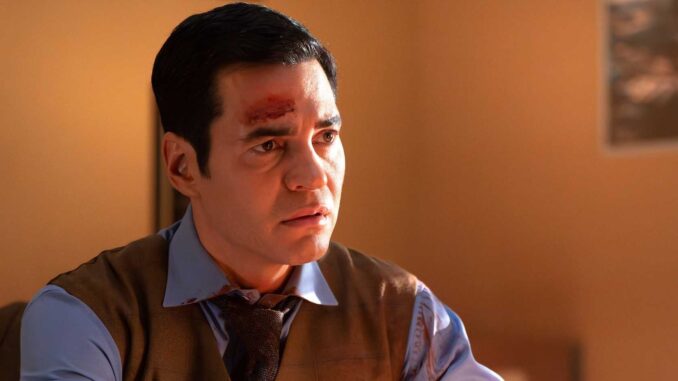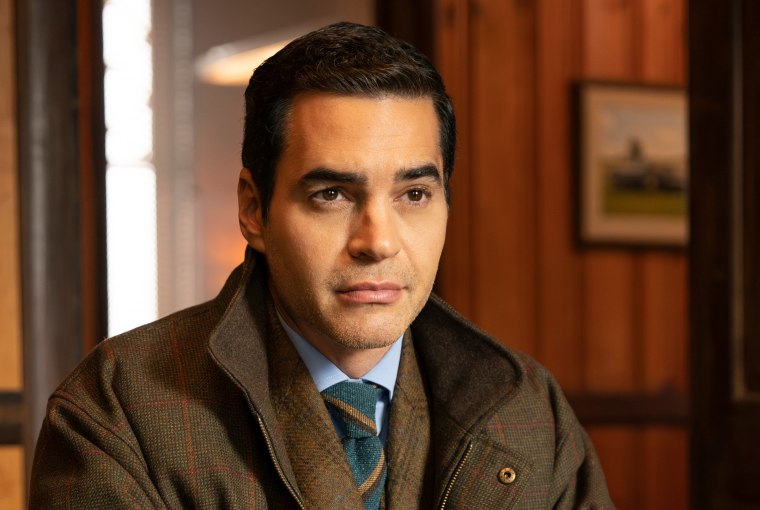
The actor of Puerto Rican heritage, who’s also a co-executive producer, liked the fact that the storyline initially made the character’s ethnicity and background ambiguous.
When he was first approached to play the title detective in “Will Trent,” the acclaimed ABC crime drama based on Karin Slaughter’s bestselling book series of the same name, Ramón Rodríguez didn’t think he was the right fit.
Having starred in a handful of unsold TV pilots and short-lived series, including the Fox crime drama “Gang Related” and the ABC remake of “Charlie’s Angels,” Rodríguez had reason to be cautious. But there was one other crucial detail that Rodríguez, who is of Puerto Rican heritage, couldn’t easily overlook: In Slaughter’s novels, Will is described as white, tall and lanky with short dirty-blond hair; Rodríguez, on the other hand, is of medium build with brown skin and dark, graying hair.
It wasn’t until Rodríguez met with Liz Heldens and Daniel Thomsen, the creators and showrunners of the “Will Trent” adaptation, that he began to see himself in the role of a dyslexic orphan who overcame a harsh upbringing in Atlanta’s foster care system to become the special agent with the highest clearance rate at the Georgia Bureau of Investigation, or GBI.
Rodríguez insisted on donning his character’s signature three-piece suits and adopting a regionally specific Southern drawl, and his steadfast commitment to portraying one of the most idiosyncratic protagonists on television has transformed “Will Trent” into a certified hit. A month after the second season recorded its highest-ever multiplatform telecast, with over 9 million viewers across seven days of viewing, ABC renewed “Will Trent” for a third season. Since it debuted as a midseason replacement in January 2023, the show has reportedly reached nearly 70 million viewers.
At a time when successful shows with diverse leads have dwindled amid cost-cutting measures in Hollywood, this reimagining of “Will Trent” is a big win for Latino representation — but in a way that subverts common tropes.
Given that he was abandoned at birth, Will begins the series with little knowledge of his own cultural heritage, which has given Rodríguez a rare opportunity to play a deeply troubled and complicated character whose ethnicity isn’t at the forefront of his characterization.
“I liked the fact that his ethnicity was ambiguous, that it was open-ended, so he could actually potentially look like me, aside from the specifics of how they write him in the book,” Rodríguez, who is also a co-executive producer on the series, said in a recent interview.
But in the final minutes of the 13-episode first season, Will discovers that his current boss, Amanda Wagner (Sonja Sohn), knew his late mother, Lucy Morales (Raiany Silva), a sex worker who grew up in Puerto Rico and was murdered in Atlanta by serial killer James Ulster (Greg Germann), who may also be his biological father. Will learns not only that Amanda found him in a trash can as a baby, but also that she named him and tried unsuccessfully to adopt him.
In season two, Will has tried to connect with his roots, starting with learning how to speak Spanish. “He’s learning a language that connects to him personally and directly to his mom,” said Rodríguez, who joked that, as a native speaker, he found it a challenge to sound more like a non-native. “The writers and I like seeing Will in uncomfortable and awkward moments of having to be vulnerable, so we’ll see more of those moments.”
Midway through the second season, Will musters up the courage to meet his dyslexic, long-lost uncle, Antonio Miranda (John Ortiz), who offers to share his memories of his late older sister, and the two bond over their shared learning disability. For the first time, Will, who has spent most of his life suppressing his traumatic upbringing on his own, feels he has some kind of semblance of the family that he has always wanted.

Thomsen told NBC News: “For Will, we’re taking him on the journey of adding something into the identity that he had created for himself. He’s a guy who is very strongly identified with the GBI, with Atlanta and all the different places that he grew up. I think what’s interesting is just getting that information so late in life when you already felt like you had a fixed definition of who you were and having that be thrown into a blender.”
“‘Will Trent’ is a big win for Latino representation — while subverting common tropes.”
Like his character, Rodríguez was raised by women; he grew up in the ’80s and ’90s with his single mother and three older sisters in a cramped apartment in Manhattan’s Lower East Side, when it was still a low-income, predominantly Black and brown barrio. Coming of age in the melting pot that was — and still is — New York City had an indelible impact on Rodríguez, who calls himself a proud “Nuyorican.”
